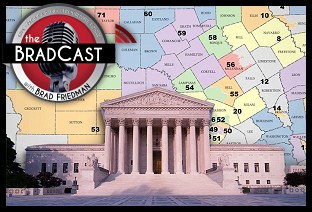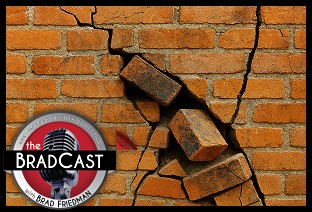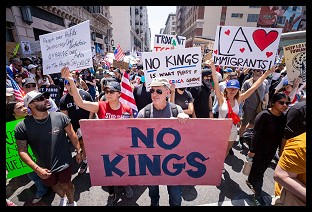 The tragic events, that left three dead and 35 injured in Charlottesville, Virginia, occurred only after the American Civil Liberties Union (ACLU) obtained a preliminary injunction from U.S. District Court Judge Glen E. Conrad that forced the City of Charlottesville to allow White supremacists --- nationwide groups that included American Nazis and the KKK --- to hold their "Unite the Right" rally.
The tragic events, that left three dead and 35 injured in Charlottesville, Virginia, occurred only after the American Civil Liberties Union (ACLU) obtained a preliminary injunction from U.S. District Court Judge Glen E. Conrad that forced the City of Charlottesville to allow White supremacists --- nationwide groups that included American Nazis and the KKK --- to hold their "Unite the Right" rally.
The ACLU's long-standing posture, as explained by its Executive Director, Anthony D. Romero, is that all forms of speech, even words which are hateful, discriminatory and repugnant, are protected by the First Amendment. The right to publicly protest, Romero insists, must "be applied neutrally and equally to all protesters."
But there were two critical issues that were overlooked by the ACLU and Judge Conrad: (1) the prospect that a heavily armed band of neo-Nazis and other White supremacists, whose ideological goal is to destroy every liberty guaranteed by the U.S. Constitution, would misuse the First Amendment protest privilege as an excuse to carry out illegal acts, and (2) the impact of unleashing armed fanatics upon the rights of others.
The so-called "Alt Right" descended on Charlottesville like an invading army --- one hell bent on intimidation and violence. In securing an injunction that contained no provision proscribing the use of armor and weapons, the ACLU succeeded in endangering the rights of the peaceful, multi-racial and multi-cultural citizens of Charlottesville to go about their daily lives free from fear, intimidation, and physical harm.
Fortunately, in the aftermath of Charlottesville, the ACLU reversed course. "The First Amendment," the civil rights organization correctly proclaimed, "does not protect people who incite or engage in violence...If white supremacists march into our towns armed to the teeth and with the intent to harm people, they are not engaging in activities protected by the United States Constitution." The ACLU, thus, will not defend a right to "armed protest."
The ACLU's reversal accords with both the First and Second Amendments to the U.S. Constitution...
Incitement not protected by 1st Amendment
As observed by the Annenberg Learner:
Our courts have explicitly balanced the conflict between the right to free speech and public safety. In Brandenburg v. Ohio (1969), the Supreme Court ruled that the government cannot convict someone for merely advocating violence. But it made clear that the right to free speech was not absolute. Speech can be proscribed if it is (1) "directed at inciting or producing imminent lawless action", and (2) if it is "likely to incite or produce such action."
Context is critical. In Brandenburg, the Court overturned the conviction of a KKK leader under an Ohio Criminal Syndicalism statute which outlawed "advocating" violence or terrorism. The remarks advocating violence that gave rise to the court case were recorded in films of two Klan rallies where no one outside of the KKK was present other than the cameraman. But it would be another matter altogether if someone within a group of armed members of the KKK, who had cornered a group of African-American teenagers yelled, "Let's lynch them"! Those words would be unlawful "incitement" under the standards laid down by the Court in Brandenburg.

Neither 1st nor 2nd Amendment protects armed protests
In Charlottesville, American Nazis, the KKK and so-called "Alt-Right" White supremacists resembled an invading army. They didn't come simply to deliver words and speeches. They came to and did intimidate all who stood peacefully in their path. In addition to torches, clubs and shields, many sported body armor and assault rifles.
This heavily-armed presence, along with open carry laws, is an extension of the willful misinterpretation of the 2nd Amendment offered up by the U.S. Supreme Court's right-wing majority in District of Columbia v. Heller (2008) --- a 5-4 decision that ignored precedent, history and basic rules of constitutional interpretation. It was a heavily-armed presence that was not taken into consideration in the Court's 1969 Brandenburg decision precisely because, under pre-Heller case law, the Second Amendment right to bear arms was explicitly limited to the right of the individual states to maintain "a well regulated militia."
But even if the Heller majority had correctly recognized a Second Amendment individual right to bear arms, that "right" must be balanced against the public's right to be free from the type of intimidation that accompanies "open carry" either by individuals or, as occurred in Charlottesville, by groups of heavily-armed, right-wing extremists, who looked very much like a band of homicidal Blackwater mercenaries.
It is one thing for White supremacists to show up at a rally carrying the hated symbols and disgracefully shouting the slogan's of Hitler's murderous Nazi regime. But it's another matter altogether when American Nazis arrive, sporting helmets, torches, clubs and semi-automatic assault weapons. As Brian McClaren, one of the many Charlottesville eye-witnesses observed: "They looked like they came expecting to fight, threaten, and intimidate."
The violence that ensued was predictable, as was the fear and intimidation.
Alan Zimmerman, the president of Charlottesville's Congregation Beth Israel, who had hired a security guard in advance of the rally, described a synagogue under siege.
"For half an hour, three men dressed in fatigues and armed with semi-automatic rifles stood across the street from the temple," Zimmerman said. "If they tried to enter [the synagogue], I don't know what I could have done to stop them." Zimmerman also described "parades of Nazis" that "passed by our building, shouting, 'There's a synagogue!' followed by chants of 'Seig Heil' and other anti-Semitic language. Some carried flags with swastikas and other Nazi symbols."
Concerned for the safety of his congregants, Zimmerman advised them "that it would be safer to leave the temple through the back entrance...and to please go in groups."
Subsequently, Zimmerman "learned that Nazi websites had posted a call to burn our synagogue."
That call to burn down a specific temple, in the context of the White supremacist presence in Charlottesville, was an incitement to imminent violence that, according to Brandenburg, was not protected free speech.
Seeds of our own destruction?
The ACLU's Anthony Romero was correct in his assertion that, as an abstract principle, the First Amendment protects the right to protest the removal of Confederate Statues and monuments. We should not overlook, however, that those monuments are symbols of abhorrent ideologies that not only celebrate 19th century treason and slavery, but also a century of Jim Crow segregation, White supremacy and a brutal campaign of lynching and other forms of White terror. Toss in the swastikas, Hitler salutes and Nazi slogans, and you come to understand that the goals of the armed protesters and their extremist ideologies is the destruction of representative democracy and every liberty guaranteed by the U.S. Constitution.
It is a circumstance that calls to mind a harsh observation once proffered by Joseph Goebbels, Nazi Germany's Minister of Propaganda. "It will remain one of democracy's best jokes," Goebbels is reported to have sarcastically quipped, "is that it provided its deadly enemies with the means by which it was destroyed."
We in the United States wring our hands over KKK and Nazi First Amendment rights and whether to take down Confederate/Jim Crow monuments to our ugly past. But in Germany, a modern day liberal democracy --- the nation that gave rise to Hitler and then suffered for it --- there was no hesitation.
In the aftermath of the fall of the Third Reich, and as part of its "denazification" efforts, Germany passed a law that "prohibits the distribution or public use of symbols of unconstitutional groups --- in particular, flags, insignia, uniforms, slogans and forms of greeting." Thus, for example, anyone who gives a Nazi salute in Germany can receive a six-month prison sentence. Similar post-World War II anti-Nazi laws were adopted by Slovakia, the Czech Republic, Sweden and Austria.
Those laws didn’t prevent a group of 500 neo-Nazi demonstrators from recently attempting to stage a rally at Berlin's now defunct Spandau Prison to commemorate the anniversary of the death of Nazi leader Rudolph Hess. But before the neo-Nazis were allowed to proceed, they were "funneled through tents where police checked them for weapons, forbidden flags and tattoos showing symbols banned in Germany, such as Nazi swastikas," the Los Angeles Times reported.
German law enforcement officers "balance protestors' rights to free speech and free assembly against the rights of counter demonstrators and residents," the Times added. "The rules mean that shields, helmets and batons carried by far-right and neo-Nazi protesters in Charlottesville, Va., wouldn't be allowed in Germany. Openly anti-Semitic chants would also prompt German police to intervene."
Unlike in Charlottesville, German police were keen to keep the neo-Nazi and counter-protestors separated, even when the counter-protestors blocked neo-Nazi access to Spandau.
While it may not be necessary for the U.S. to carve out a similar exception to freedom of speech otherwise guaranteed by the First Amendment by banning anti-Semitic remarks and hateful symbols, it does seem appropriate that hard-right antagonism towards our constitutional liberties be treated as a factor that must be considered in rejecting a right to "armed protests." And certainly the tactics employed by German police --- funneling right-wing extremists through tents to insure they are not armed --- would be appropriate for law enforcement in the U.S. to apply to ensure public safety and what the U.S. Constitution expressly describes as "domestic tranquility".
 Ernest A. Canning is a retired attorney, author, Vietnam Veteran (4th Infantry, Central Highlands 1968) and a Senior Advisor to Veterans For Bernie. He has been a member of the California state bar since 1977. In addition to a juris doctor, he has received both undergraduate and graduate degrees in political science. Follow him on twitter: @cann4ing
Ernest A. Canning is a retired attorney, author, Vietnam Veteran (4th Infantry, Central Highlands 1968) and a Senior Advisor to Veterans For Bernie. He has been a member of the California state bar since 1977. In addition to a juris doctor, he has received both undergraduate and graduate degrees in political science. Follow him on twitter: @cann4ing


 SCOTUS Ruling a How-To for Unlawful Gerrymandering on 'Eve' of Critical Election Year: BradCast' 12/17/25
SCOTUS Ruling a How-To for Unlawful Gerrymandering on 'Eve' of Critical Election Year: BradCast' 12/17/25 Bricks in the Wall:
Bricks in the Wall: 'Green News Report' 12/16/25
'Green News Report' 12/16/25
 'This One Goes to 11': Weekend of Violence, Tragic Murder of Rob Reiner: 'BradCast' 12/15
'This One Goes to 11': Weekend of Violence, Tragic Murder of Rob Reiner: 'BradCast' 12/15 Sunday 'WTF?' Toons
Sunday 'WTF?' Toons Trump Now Losing One
Trump Now Losing One 'Green News Report' 12/11/25
'Green News Report' 12/11/25 Dems Continue Stunning 2025 Election Streak: 'BradCast' 12/10/25
Dems Continue Stunning 2025 Election Streak: 'BradCast' 12/10/25 Petrostates and Propagandists Undermining Climate Science: 'BradCast' 12/9/25
Petrostates and Propagandists Undermining Climate Science: 'BradCast' 12/9/25 'Green News Report' 12/9/25
'Green News Report' 12/9/25 The High Cost of Trump's Terrible Policy Making: 'BradCast' 12/8/25
The High Cost of Trump's Terrible Policy Making: 'BradCast' 12/8/25 Sunday 'All in a Day's Work' Toons
Sunday 'All in a Day's Work' Toons Dems Fight to Avoid the GOP's Massive, Year-End Health Care Cliff: 'BradCast' 12/4/25
Dems Fight to Avoid the GOP's Massive, Year-End Health Care Cliff: 'BradCast' 12/4/25 'Green News Report' 12/4/25
'Green News Report' 12/4/25 A 'Flashing Red Warning Sign' for GOP: 'BradCast' 12/3/25
A 'Flashing Red Warning Sign' for GOP: 'BradCast' 12/3/25 Hegseth, War Crimes and DoD's 'Politicization Death Spiral': 'BradCast' 12/2/25
Hegseth, War Crimes and DoD's 'Politicization Death Spiral': 'BradCast' 12/2/25 Follow the
Follow the  With Thanks, No Kings and Good Cheer
With Thanks, No Kings and Good Cheer Presidential Illegality and Duty to Disobey
Presidential Illegality and Duty to Disobey President of United States Calls for Killing Democratic Officials: 'BradCast' 11/20/25
President of United States Calls for Killing Democratic Officials: 'BradCast' 11/20/25 Is MAGA Finally Beginning to Fall Apart?: 'BradCast' 11/19/25
Is MAGA Finally Beginning to Fall Apart?: 'BradCast' 11/19/25 Trump's Terrible, Horrible, No Good, Very Bad Week: 'BradCast' 11/18/25
Trump's Terrible, Horrible, No Good, Very Bad Week: 'BradCast' 11/18/25
 VA GOP VOTER REG FRAUDSTER OFF HOOK
VA GOP VOTER REG FRAUDSTER OFF HOOK Criminal GOP Voter Registration Fraud Probe Expanding in VA
Criminal GOP Voter Registration Fraud Probe Expanding in VA DOJ PROBE SOUGHT AFTER VA ARREST
DOJ PROBE SOUGHT AFTER VA ARREST Arrest in VA: GOP Voter Reg Scandal Widens
Arrest in VA: GOP Voter Reg Scandal Widens ALL TOGETHER: ROVE, SPROUL, KOCHS, RNC
ALL TOGETHER: ROVE, SPROUL, KOCHS, RNC LATimes: RNC's 'Fired' Sproul Working for Repubs in 'as Many as 30 States'
LATimes: RNC's 'Fired' Sproul Working for Repubs in 'as Many as 30 States' 'Fired' Sproul Group 'Cloned', Still Working for Republicans in At Least 10 States
'Fired' Sproul Group 'Cloned', Still Working for Republicans in At Least 10 States FINALLY: FOX ON GOP REG FRAUD SCANDAL
FINALLY: FOX ON GOP REG FRAUD SCANDAL COLORADO FOLLOWS FLORIDA WITH GOP CRIMINAL INVESTIGATION
COLORADO FOLLOWS FLORIDA WITH GOP CRIMINAL INVESTIGATION CRIMINAL PROBE LAUNCHED INTO GOP VOTER REGISTRATION FRAUD SCANDAL IN FL
CRIMINAL PROBE LAUNCHED INTO GOP VOTER REGISTRATION FRAUD SCANDAL IN FL Brad Breaks PA Photo ID & GOP Registration Fraud Scandal News on Hartmann TV
Brad Breaks PA Photo ID & GOP Registration Fraud Scandal News on Hartmann TV  CAUGHT ON TAPE: COORDINATED NATIONWIDE GOP VOTER REG SCAM
CAUGHT ON TAPE: COORDINATED NATIONWIDE GOP VOTER REG SCAM CRIMINAL ELECTION FRAUD COMPLAINT FILED AGAINST GOP 'FRAUD' FIRM
CRIMINAL ELECTION FRAUD COMPLAINT FILED AGAINST GOP 'FRAUD' FIRM RICK SCOTT GETS ROLLED IN GOP REGISTRATION FRAUD SCANDAL
RICK SCOTT GETS ROLLED IN GOP REGISTRATION FRAUD SCANDAL VIDEO: Brad Breaks GOP Reg Fraud Scandal on Hartmann TV
VIDEO: Brad Breaks GOP Reg Fraud Scandal on Hartmann TV RNC FIRES NATIONAL VOTER REGISTRATION FIRM FOR FRAUD
RNC FIRES NATIONAL VOTER REGISTRATION FIRM FOR FRAUD EXCLUSIVE: Intvw w/ FL Official Who First Discovered GOP Reg Fraud
EXCLUSIVE: Intvw w/ FL Official Who First Discovered GOP Reg Fraud GOP REGISTRATION FRAUD FOUND IN FL
GOP REGISTRATION FRAUD FOUND IN FL

































